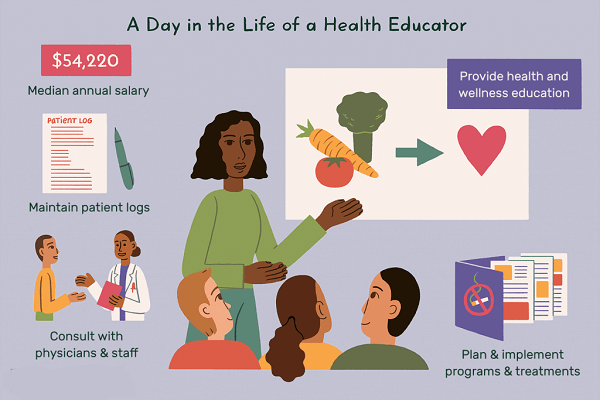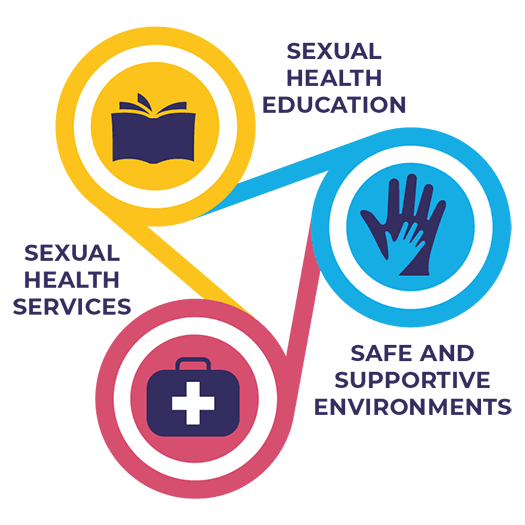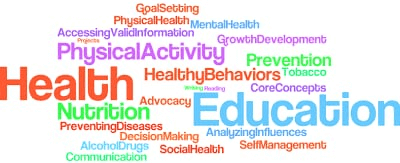Health Education DefinitionIt is a profession of enlightening people about health. Subjects within this profession encompass reproductive and sexual health education, Social Health, Intellectual Health, Emotional Health, Environmental Health, and Physical Health. 
It can be defined as the principle by which individuals and groups learn to behave in a way conducive to promoting, maintaining, and restoring health. Health is defined in multiple ways. Therefore, health education is also defined in multiple dimensions. According to the definition by the Joint Committee of Health and Education and Promotion Terminology of 2001 the United States, "any combination of planned learning experiences based on the sound theories that provide individuals, groups, and communities the opportunity to acquire information and the skills needed to make quality health decisions". According to the definition of, the World Health Organisation (WHO), Health education as consisting of "consciously constructed opportunities for learning involving some form of communication designed to improve health literacy, that includes improving knowledge and developing life skills which are conducive to individual and community health. HistoryIt is believed that health education started from the initial stages of healthcare in ancient history when humanity enlightened from generation to generation. Protected text from the oldest civilizations Persia, China, Greece, Rome, Egypt, and India, contains a plethora of knowledge regarding treating diseases and preventive measures. The first medical school was formed at the culmination of the 8th century in Salerno, Italy, and most of their syllabus stressed maintaining proper healthy lifestyles and hygiene, but Johann Guttenberg's printing press cleared the way for educational materials to be accessible to all, and it helped them to fight epidemics by adopting a healthy and hygienic lifestyle. Awareness began to grow in the 19th century among the common people about health and other topics. As medicine progressed, new subjects were explored to solve new problems and techniques to offer health education. Before the 1960s, physician was fundamentally responsible, and patients had a passive role in their decisions. The concept of health education began to take off after the Patients Education and Counselling journal was established. Around this time, the realization came that if patients are aware of their health, they can improve it by adopting healthy lifestyles. Patient Advocacy Group in the 1980s grabbed attention with the issue of patient rights, including the right to be informed about health and potential choices for care. Many associations have emerged in the 21st century and are designated platforms for fostering health education and communication. The objective and method of health education in the US have unfolded gradually. The goal of Public Health from the 19th century to the 20th century was controlling the danger from the contagious ailment overall under the command. In the US, Health education was seen as transmitting healthy medical practices to those who practice them. It was amply visible that reduced death, growing health care costs, and illness can be accomplished through fostering health propaganda and disease prevention. The central point of this concept was the role of the health educator. Role of the Health Education SpecialistThey are a professionally readied person who acts in various roles and is particularly trained to apply educational plans and techniques to facilitate the development of procedures, policies, interventions, and systems that contribute to the health of communities, groups, and individuals. In other words, their role is to design, evaluate and conduct tasks that involve the development of the well-being and health of the people. Some examples include health program managers, education teachers, patient educators, and community organizers. There are no fixed titles because there is no definite health education system. Peer Health EducatorsPeer Health Educators are labelled as students taking the initiative to apprise their peers of ways to live a healthy lifestyle. Prevention is a central point of this concept and includes emotional well-being, alcohol and sexual health and many more aspects. Teaching School Health Education
Research has found that students know that healthy eating and emotions influence each other. These include positive self-image, emotional health, respect for and care for the human body and its critical organs, and exercise results on the body and general well-being. Mental HealthThe mental health subject is getting more popular and being conceded by society. Well-developed mental health literacy allows students to handle their mental health and assists others. Enlightening children about mental health in school will enable them to see it as a common occurrence and will not be taken lightly. There has been increased effort in the teaching of such programs, but the issue remains that educators are equipped with little skills to deal with mental health complexities and difficulties. Educators do not possess such medical training that they would be able to impart to students they need to know. To make teachers well aware of mental health topics and to boost their confidence, these topics, programs, and training should be included in their teaching curriculum. Students can learn about mental health from community-based interventions as well. This opens the door for the experts to come in and enlighten the youth about the symptoms of mental illness and suggest methods to manage them. This knowledge would help an individual's mental health importance and will guide them shortly. Parents should be encouraged to discuss such topics with their children. Open discussions on the subjects like mental health will enable the student to feel more comfortable, and the children will interact more with this subject. Parents should be supportive in their approach and willing to hear their child's problems. National Health Education StandardsThe National Health Education Standards are written assumption for the students and what abilities they should possess in grades 2, 5, 8, and 12 to foster community, family, and personal health. The standards offer a foundation for instruction, curriculum development, selection, and student assessment in health education. The performance indicators act as a blueprint for conducting student evaluations. Health Education Code of EthicsThe Health Education Code of Ethics has been underway since 1976, and it was started by Society for Public Health Education in 1976. The Code of ethics is still evolving and subject to arduous and long processes, and it is still not a completed project. It has been envisaged as a living document that will evolve continuously as the practice of Health Education changes to fulfil the challenges of the new generation. School Health Education Worldview
RomaniaMinistry of Education, Research, Youth and Sports have formed a national curriculum on Health Education. The objective of the study program was the development of students' securing knowledge and practical skills, and possess expertise in Nutrition and Dietetics. A study program was launched at the University of Medicine and Pharmacy of luliu Hatieganu in 2008. JapanSchool Nurses in Japan are referred to as Yogo teachers and also called hoken kyoushi. Yogo teachers enrol as academic staff and encourage student growth via health education and services under the school's educational activities. Yogo teachers are specialized in managing students' physical and mental health. Yogo teachers can recognize early-stage mood disorders among the students with the impression of student behaviour. Some factors involved in mood disorders include past diagnosis, family history, trauma and physical illness. Yogo teachers possess skills to ascertain mental or physical abuse cases from normal teachers. Due to this, they are expected to take swift action during the early stages of mood disorders. TaiwanHealth Education in Taiwan stresses various points that include:
United KingdomThe United Kingdom has enacted health education in its education system since the early 2000s. The United Kingdom school system also imparts information on mental health to its students and educates them about obesity and a healthy lifestyle. Health Education and Sustainable Development Goals (SDGs)United Nations has framed Sustainable Development Goals in which health education plays a significant role in achieving SDGs goals. Improving the implementation of Health education brings consciousness and awakens the individual, forming an understanding of the importance of international well-being and health. What are SDG Goals?It is also called Global Goals undertaken by the United Nations in 2015 as a Global call to eliminate poverty, protect the earth, and ensure peace and prosperity for all by 2030. The 17 SDG goals are:
Aims of Health Education
Objectives of Health EducationA detailed list of functional objectives of health education is practised in the school, and they are written below:
Importance of Health EducationHealth is the most valuable asset. Therefore, health education is becoming more important these days. Health education assists us in the following ways:
Where are Health Educators Employed?
Next TopicHeat Definition
|
 For Videos Join Our Youtube Channel: Join Now
For Videos Join Our Youtube Channel: Join Now
Feedback
- Send your Feedback to [email protected]
Help Others, Please Share










